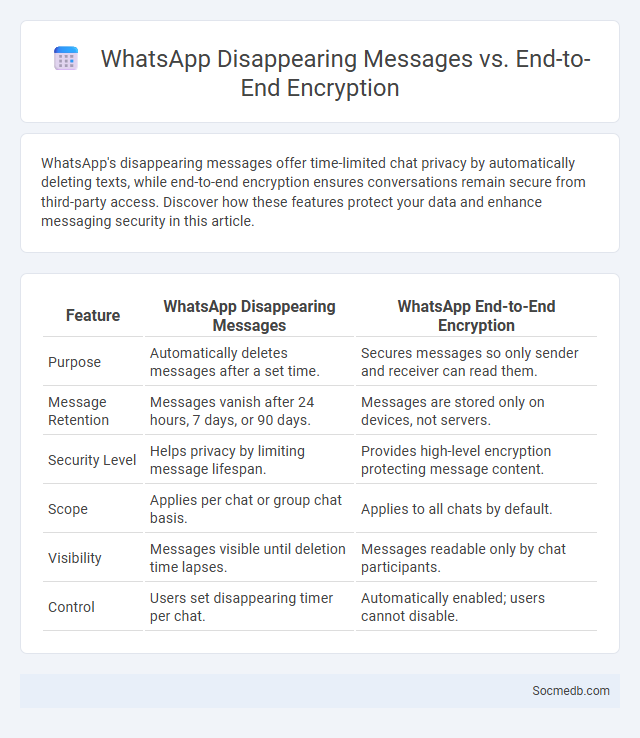
Photo illustration: WhatsApp Disappearing Messages vs End-to-End Encryption
WhatsApp's disappearing messages offer time-limited chat privacy by automatically deleting texts, while end-to-end encryption ensures conversations remain secure from third-party access. Discover how these features protect your data and enhance messaging security in this article.
Table of Comparison
| Feature | WhatsApp Disappearing Messages | WhatsApp End-to-End Encryption |
|---|---|---|
| Purpose | Automatically deletes messages after a set time. | Secures messages so only sender and receiver can read them. |
| Message Retention | Messages vanish after 24 hours, 7 days, or 90 days. | Messages are stored only on devices, not servers. |
| Security Level | Helps privacy by limiting message lifespan. | Provides high-level encryption protecting message content. |
| Scope | Applies per chat or group chat basis. | Applies to all chats by default. |
| Visibility | Messages visible until deletion time lapses. | Messages readable only by chat participants. |
| Control | Users set disappearing timer per chat. | Automatically enabled; users cannot disable. |
Introduction to WhatsApp Privacy Features
WhatsApp employs end-to-end encryption to ensure that messages, calls, photos, and videos remain private between users, preventing unauthorized access. Users can customize their privacy settings to control who sees their profile photo, status, last seen, and read receipts, enhancing personal security. The platform continuously updates its features, such as disappearing messages and two-step verification, to provide stronger protection of user data against potential breaches.
What Are Disappearing Messages on WhatsApp?
Disappearing messages on WhatsApp are a feature that allows users to send texts, images, or videos that automatically delete after a set period, enhancing privacy and limiting digital footprints. This function can be enabled for individual chats or group conversations, with options ranging from 24 hours to 90 days for message expiration. By ensuring that messages vanish after the chosen timeframe, WhatsApp helps reduce data clutter and potential exposure of sensitive information.
How End-to-End Encryption Works on WhatsApp
End-to-end encryption on WhatsApp ensures that only you and the person you're communicating with can read the messages, preventing hackers, WhatsApp, or third parties from accessing your chats. This encryption uses a pair of cryptographic keys: a public key to encrypt the message and a private key to decrypt it, both stored exclusively on your device. Every message you send is secured with a unique lock that only the intended recipient's private key can open, guaranteeing complete privacy in your conversations.
Disappearing Messages vs End-to-End Encryption: Key Differences
Disappearing messages automatically delete after a set time, providing temporary privacy by removing content from both sender and receiver devices. End-to-end encryption ensures that only you and the intended recipient can access the message content, protecting data from interception throughout transmission. Understanding these differences helps you choose the best security feature for your communication needs.
Benefits of Using Disappearing Messages
Disappearing messages enhance privacy by automatically deleting content after a set time, reducing the risk of sensitive information being stored or shared unintentionally. This feature encourages more authentic and spontaneous communication, allowing you to share moments without worrying about long-term digital footprints. Using disappearing messages can also help manage storage by preventing chat clutter, making your social media experience more streamlined and efficient.
Security Advantages of End-to-End Encryption
End-to-end encryption ensures that only you and the intended recipient can access messages or data, preventing unauthorized access from hackers or third parties. This security measure protects your private information from being intercepted during transmission, enhancing confidentiality and trust in social media communications. By safeguarding your interactions, end-to-end encryption significantly reduces the risk of data breaches and identity theft.
Limitations of Disappearing Messages
Disappearing messages on social media platforms face limitations such as lack of long-term record-keeping and potential misuse for harmful content due to their ephemeral nature. These messages often challenge digital forensics and moderation efforts, complicating the enforcement of platform policies and legal accountability. User privacy can be compromised if recipients capture or screenshot the content before it disappears.
Are Disappearing Messages Truly Secure?
Disappearing messages on social media platforms offer temporary communication by automatically deleting content after a set time, reducing the risk of long-term data storage. However, these messages are not entirely secure, as recipients can still capture screenshots, use third-party apps, or exploit platform vulnerabilities to save content without your consent. Understanding the limitations of disappearing messages helps you make informed decisions about sharing sensitive information online.
Best Practices for Enhanced Privacy on WhatsApp
To enhance your privacy on WhatsApp, regularly update your app to access the latest security features and enable two-step verification for added account protection. Customize your privacy settings by controlling who can see your profile photo, status, and last seen information, limiting access to trusted contacts only. Use end-to-end encrypted chats and avoid sharing sensitive information in group conversations to maintain confidentiality.
Choosing the Right Privacy Feature for Your Needs
Selecting the appropriate privacy settings on social media platforms depends on understanding features like profile visibility, audience restrictions, and data sharing controls. Users should evaluate options such as private accounts, friend lists, and custom permission levels to safeguard personal information effectively. Regularly updating privacy preferences ensures protection against unauthorized access and enhances overall online security.
 socmedb.com
socmedb.com